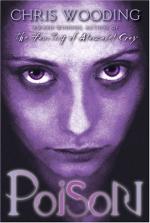|
This section contains 529 words (approx. 2 pages at 300 words per page) |

|
A poison is a compound that produces a deleterious change on or in the body. There are a large number of known poisons, with a myriad of effects. Toxicity is a general term used to indicate adverse effects produced by poisons. These adverse effects can range from slight symptoms such as headaches or nausea, to severe symptoms such as coma, convulsions, and death.
The hallmark of a poison is that it changes some aspect of a body function, often the speed of a function. Examples of this include increased heart rate or sweating, or decreasing breath (sometimes to the point of death). A poison may have wide-ranging effects in the body, may damage only a particular region or organ, or may do both. An example of the latter is an insecticide called Parathion. It inactivates a particular enzyme that functions in communication...
|
This section contains 529 words (approx. 2 pages at 300 words per page) |

|


